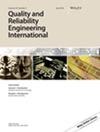Unbiased process capability estimation for autocorrelated data using exhaustive systematic sampling
IF 2.8
3区 工程技术
Q3 ENGINEERING, INDUSTRIAL
引用次数: 0
Abstract
It is well known that process control index estimators are inflated when naively applied to positively autocorrelated data. The autocorrelation is a nuisance and not a feature that is captured in the process capability indices. This paper proposes exhaustive systematic sampling to create a pooled variance estimator that replaces the biased estimator of the process data standard deviation when data are autocorrelated. The proposed method is effective because the observations within a systematic sample are spread out in time and should be less correlated with each other as a result. It is similar to Bayesian thinning as a strategy for reducing the impact of autocorrelation except no observations are dropped. Properties of estimated process control indices are derived using quadratic forms and large sample theory that is nonparametric in the sense no distribution or time series model is assumed. Approximately unbiased estimates can be achieved for sufficiently large systematic sampling interval. The proposed method is compared to the time series method in a simulation study that demonstrates similar performance. The proposed method is applied to two examples that use because the target is not the midpoint of the specification limits and the mean differs from the target.利用详尽系统抽样对自相关数据进行无偏过程能力估计
众所周知,过程控制指数估计值如果被简单地应用于正相关的自相关数据,就会被夸大。自相关是一种干扰,并不是过程能力指数所能捕捉到的特征。本文提出了详尽的系统抽样方法,以创建一个集合方差估计器,在数据自相关时取代有偏差的过程数据标准偏差估计器。所提议的方法之所以有效,是因为系统抽样中的观测值在时间上是分散的,因此相互之间的相关性较低。该方法类似于贝叶斯稀疏法,是一种减少自相关影响的策略,但不会丢弃任何观测值。估计过程控制指数的特性是利用二次形式和大样本理论推导出来的,这种理论是非参数的,即不假定分布或时间序列模型。对于足够大的系统抽样间隔,可以获得近似无偏的估计值。在一项模拟研究中,将所提出的方法与时间序列方法进行了比较,结果表明两者性能相似。由于目标值不是规格限的中点,且平均值与目标值不同,因此提出的方法适用于两个例子。
本文章由计算机程序翻译,如有差异,请以英文原文为准。
求助全文
约1分钟内获得全文
求助全文
来源期刊
CiteScore
4.90
自引率
21.70%
发文量
181
审稿时长
6 months
期刊介绍:
Quality and Reliability Engineering International is a journal devoted to practical engineering aspects of quality and reliability. A refereed technical journal published eight times per year, it covers the development and practical application of existing theoretical methods, research and industrial practices. Articles in the journal will be concerned with case studies, tutorial-type reviews and also with applications of new or well-known theory to the solution of actual quality and reliability problems in engineering.
Papers describing the use of mathematical and statistical tools to solve real life industrial problems are encouraged, provided that the emphasis is placed on practical applications and demonstrated case studies.
The scope of the journal is intended to include components, physics of failure, equipment and systems from the fields of electronic, electrical, mechanical and systems engineering. The areas of communications, aerospace, automotive, railways, shipboard equipment, control engineering and consumer products are all covered by the journal.
Quality and reliability of hardware as well as software are covered. Papers on software engineering and its impact on product quality and reliability are encouraged. The journal will also cover the management of quality and reliability in the engineering industry.
Special issues on a variety of key topics are published every year and contribute to the enhancement of Quality and Reliability Engineering International as a major reference in its field.

 求助内容:
求助内容: 应助结果提醒方式:
应助结果提醒方式:


